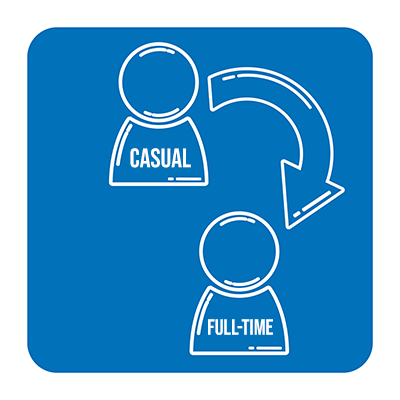In March 2021, the Fair Work Act 2009 (Cth) was amended to add a new entitlement to the existing National Employment Standards (NES). The changes provide casual employees with the right to access permanent full time or part time employment if a specific set of criteria is met. This process is also known as ‘casual conversion.’

The right to casual conversion already exists under certain Modern Awards. However, the new NES entitlement aims to extend its reach to all employees in the national workplace relations system. This means that employees who are not necessarily covered by a modern award or enterprise agreement can still enjoy the right to request casual conversion if eligible.
If you are a regular casual employee or a business that employs a casual workforce, keep reading to learn how the changes might affect you.
I’m a casual employee – what do the changes mean for me?
Under the new provisions, you can make a request to convert to permanent employment if you:
- have been employed by your employer for at least 12 months;
- have worked a regular pattern of hours on an ongoing basis within the last 6 months; and
- can continue to do so once (and if) your request is accepted.
The number of hours worked in the last 6 months will provide you with a point of reference for determining which type of employment you may convert to. Take the following as an example…
Katie works at a small coffee shop in the suburbs of Melbourne. Although her employment contract states she is a casual employee, Katie is always willing to lend a helping hand and work more hours when needed. For the past year, Katie has worked a total of 38 hours on a weekly basis – the equivalent to a full-time employee. Under the NES , Katie may therefore request to convert to full-time employment.
You must ensure you provide your employer with a request in writing. By law, an employer must then communicate their decision to you within 21 days. A request can be rejected, but only if there are ‘reasonable grounds’ for doing so.
If your request is granted, you will enjoy various benefits that casual employees are often not entitled to. These include the likes of sick leave, annual leave and better job security.
I’m an employer – what do the changes mean for me?
In addition to responding to employee’s requests for casual conversion, the new NES imposes a positive obligation on employers to offer their casual workers a pathway to permanent employment – subject to some exceptions. If you qualify as a small business employer with 15 employees or less, these changes won’t affect you.
The provisions concerning offers of casual conversion operate much like those discussed above. To be able to receive an offer, a casual employee must:
- have been employed for at least 12 months;
- have worked a regular pattern of hours on an ongoing basis within the last 6 months; and
- can continue to do so once (and if) they accept the offer.
As a medium or large business employer, you are now entitled to provide any eligible existing causal employees with an opportunity to convert to permanent employment within 21 days after reaching their 12-month anniversary. You are, however, not obliged to do so if ‘reasonable business grounds’ exists. This may include any significant changes to an employee’s days or regular hours of work.
To maintain compliance with the amended Fair Work provisions, we strongly recommend reviewing any existing casual employment agreements to make a note of employment commencement dates. Having established procedures in place will ensure you are aware of when you must make the relevant offer.
For further information on the changes, visit the Fair Work website.
Article Date: 25 May 2021 by Kirra Griffin
 Kirra Griffin is a final-year law student at Melbourne Law School. As our resident legal assistant, Kirra uses her specialised knowledge of the law to translate complex concepts into easily digestible information.
Kirra Griffin is a final-year law student at Melbourne Law School. As our resident legal assistant, Kirra uses her specialised knowledge of the law to translate complex concepts into easily digestible information.
 Casual Employment Contract Template Kit
Casual Employment Contract Template Kit
This Casual Employment Contract template is for casual employees who are employed under a modern award where the standard award entitlements apply. A Casual employee has no firm advance commitment to a continuing and definite pattern of work. They don’t usually receive sick leave or annual leave and should be paid a casual loading to offset this lack of entitlements.
Bar staff or shop assistants who are never exactly sure when they will be required for work are prime examples.
View all our Employment Agreements
Related Articles
Learn: What is a Casual Employee?
Learn: Why use a Casual Emploment Contract?
Learn: What is the difference between Casual and Part Time Employees?

